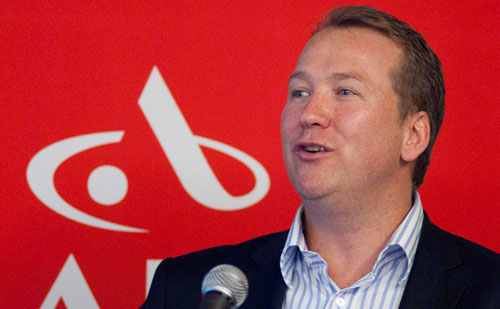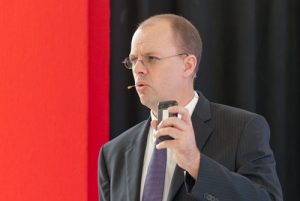
Absa on Tuesday said it is trialling near-field communications (NFC) payments with 500 of its employees. The trial will be fully underway by the end of January, and the bank intends rolling out the service to consumers shortly thereafter.
Some of the initial partners for the programme include BlackBerry-maker Research in Motion, Vivo and MasterCard.
For the purposes of the trial, and so that users needn’t change handsets, Absa is using a miniature SD card that adds NFC functionality to devices. Eventually, the bank intends integrating it directly into Sim cards, which it says are almost identical to the chips found in bank cards today.
Simon Just, Absa Card’s head of consumer issuing services, says traditional card payments and mobile payments are gradually merging. “There’s a need to be able to pay instantly and securely where you are without having to login to Internet banking or cellphone banking.”
He says Absa’s recently launched range of contactless payments can be traced back to the original chip-card model that was launched in 2003.
Absa already offers a prepaid standalone convenience card that can be used to pay for transport by tapping it against a reader.
In 2012, most Absa cards will be available with optional tap-and-go technology. Just says there are various merchants looking at contactless payment options for low-value payments and that this should help drive uptake.
Though contactless services are starting with low-value transactions, Just says this is a “gateway” to the “bigger world of mobile payments”, and is a necessary precursor to NFC via mobile devices.
Adrian Vermooten, Absa’s deputy managing executive for digital channels, says mobile phones are already multifaceted devices and that there is great potential for various NFC applications, including payments, access control, ticketing, coupons and rewards.
Users in the Absa trial will download a digital wallet applet, which can then be linked to an account via a 16-digit card number. The user than has to select a PIN and the account is active instantly.

The applet sits on the mobile phone, and Vermooten says it’s a “wallet-like container” with an “interface and presentation layer” that allows users to insert coupons and the like. He says they’re creating open standards so wallets can work with various third parties.
For the trial process, the actual NFC hardware will come in the form of a microSD card, structured for security and which includes an NFC aerial. It interacts directly with the mobile device’s operating system.
“BlackBerry has been chosen as the device manufacturer for the trial phase as it’s the primary device on the Absa and Vodacom campuses,” Vermooten says. He says BlackBerry smartphones are “ubiquitous” and the trial supports four or five models from the Canadian manufacturer.
Various handsets now offering built-in NFC hardware and Vermooten says that although this won’t be supported during the trial it will be supported “in due course” as NFC handsets become more widely available.
The scale of the NFC trial will be fairly limited. It will take place in the transit environment in the Western Cape, at Vodacom’s Vodacom World building in Midrand, at Absa’s head office, and in a small number of other locations.
Christo Vrey, managing executive of Absa digital channels, says the bank is also continuing to focus on the overhaul of its ATMs, improving the user interface on the units and increasing functionality, like the ability to clear cash deposits immediately.
Vrey says in the first quarter of next year, the bank’s ATMs will offer two new services. The first of these, eStamp, will allow customers to print three months of bank statements that include an official stamp and unique code so that consumers needn’t go into a branch for certified statements.
Merchants will be able to call a number to verify the authenticity of the statement via the unique code should they wish to do so.
The second service will allow consumers, both Absa and non-Absa customers, to make third-party bill payments using Absa’s ATMs. Users will be able to scan the barcode on a wide variety of bills and pay via an immediate cash deposit or, in the case of existing Absa customers, via any of their accounts. — Craig Wilson, TechCentral
- Subscribe to our free daily newsletter
- Follow us on Twitter or on Google+ or on Facebook
- Visit our sister website, SportsCentral (still in beta)




